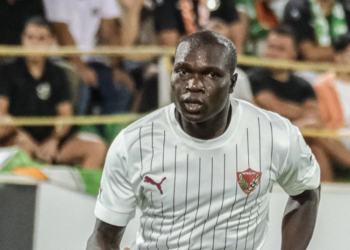The public response to Jules Nyongha’s provisional list of players called to the Lions squad for the upcoming Ghana 2008 qualifying game has been less than muted. Sure, no football pundit nor eager fan has come out with a mean broadside against the coach, but the relentless sniping and bitching that have been directed towards him have reached unsettling heights.
It is one thing to pooh-pooh the coach’s decisions or heap scorn on his choices, but it is another to level what I consider undeserved criticism against a man who, we should not forget, is just a caretaker official without the means nor the backbone to pull his weight in the snake pit of Cameroon football.
Mind you, this scribe would not stick his neck out for Mr. Nyongha. I believe that he would be a poor choice as coach for the Lions. There would be no value-added with him, no newer approaches, no appearance of a clear departure from past practices that we have all come to loathe and despise.
Still, there is one thing one can say about the interim coach: he has always been there, quiet, collected and respectable. You can say that the man has weathered a few storms. It is a positive thing that should be acknowledged. But it is not, rather only smear campaigns based on innuendos and disparaging comments follow his moves. Mr. Nyongha, we are told, would be in cahoots with older players who hang on for decades through corruption and influence-peddling, thus preventing the younger ones from cracking the first team line-up.
I am reminded of a haunting tale of depression-ravaged America told by Sydney Pollack, where men and women engaged in dance marathons for days and nights and would eventually die on the dance floor rather than quit before it is too late. Is our national team a collection of old players who do not want to quit and who enjoy the protection of coaches and other officials through influence and money? Let’s settle this misconception here and now.
In 1994, Rigobert Song was in California with the likes of Bell and Milla. He is the only one still active on the Lions roster. By comparison, Argentina’s Javier Zanetti and Roberto Ayala, members of the national squad, are still active today. No Italian nor German from that era is active on the national squad to-day.
The picture is clearer and quite revealing if we consider things from the World Cup of 1998, nine years ago. France, the winner, has Thuram, Vieira, Makelele and Henry, still very active to-day. The Italians have del Piero, Inzaghi and Nesta. The Germans have just Lehman. We have only Eto’o (who was barely 18), Song and Njitap.
So, actually, the active roster of the Lions ages well and compares favourably with the rosters of other leading football powerhouses. The criticism focusing on length of service with the team seems grossly misguided.
We do not trust the team we see being put together, but we are loath to recognize that the dearth of worthy footballers we are experiencing may have more to do with the general sorry state of the game back home than with the unsavoury dealings of a caretaker coach.
In 2000 in Sydney, we won the gold medal with a great win over Spain. The heroes of the day, still active on the squad, were Eto’o, Njitap, Mbami, Kameni, Ngom Kome and Meyong Ze. One exceptional player (Eto’o), one good player (Njitap) and four utility players.
The players we beat have almost all flowered into world class footballers and become household names even in the remotest parts of our country. Lacruz, Capdevila, Aranzubia, Unai, Albelda, Angulo, Xavi, Jose Mari, Puyol, Luque, Tamudo…
This is where we are hurting. Song is still hanging in there because the coach does not trust what he sees as a possible replacement.











